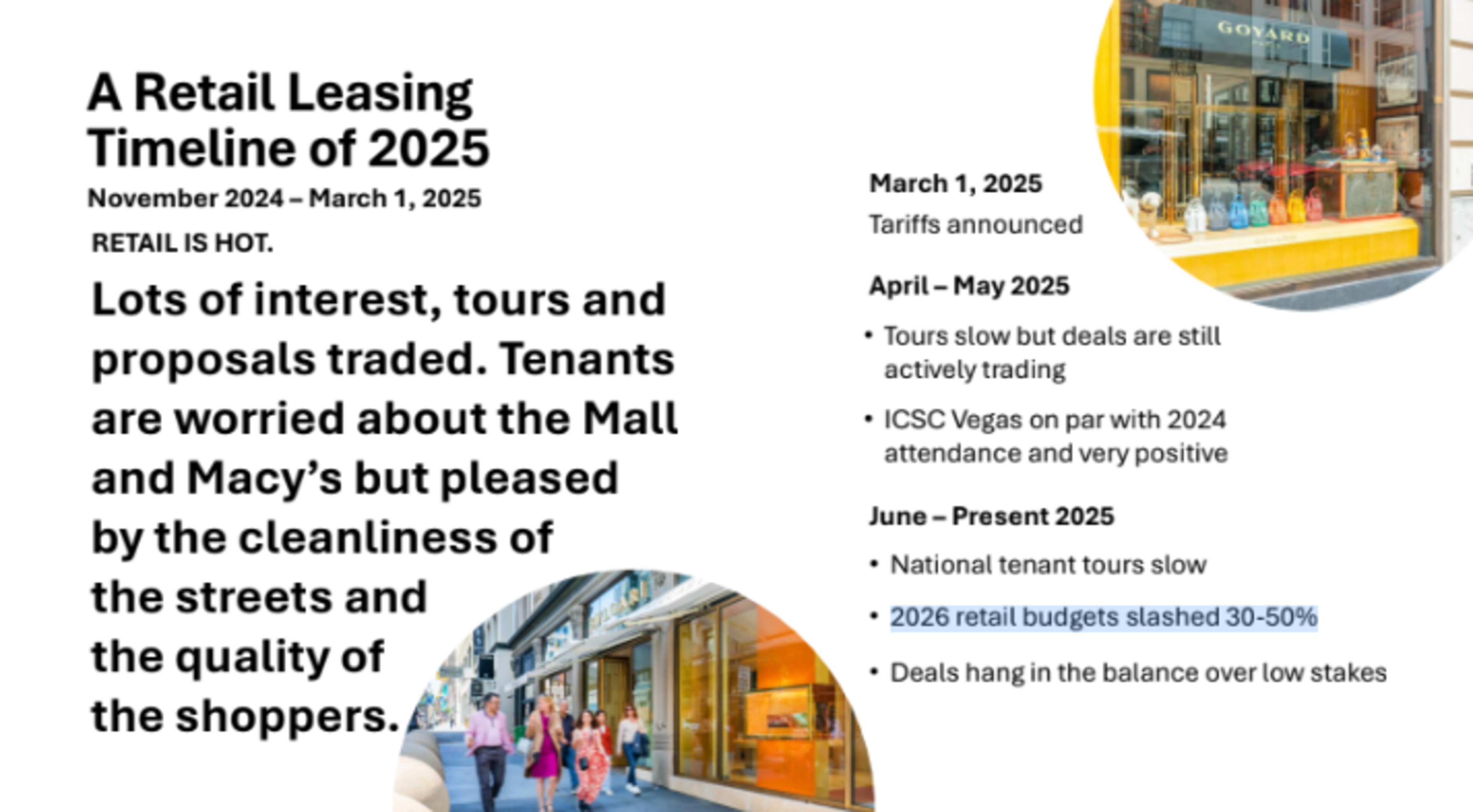Dozens of business owners, landlords, brokers, and retail representatives packed into a conference room at Union Square’s Marriott Hotel on Thursday for a Marketing and Economic Development Summit (opens in new tab) to celebrate a spate of good news.
There’s new investment, impending openings, cleanliness and safety improvements, and the feeling that the city has escaped the doom-loop narrative. Ali McEvoy, a retail broker at Maven Commercial, spent the bulk of a presentation about the state of retail in Union Square (applause breaks included) touting all the factors working in the city’s favor.
But one negative lurked amid the compliments that could hinder the area’s prospects and cut short its comeback.
“Does anyone have an idea of what this one word ‘bump’ is?” she asked.
On cue, a handful of voices glumly responded: tariffs.
When President Donald Trump announced his “Liberation Day” trade rules this spring, retailers generally shouldered the burden, McEvoy said. But by the summer, property tours from national brands had started to slow.
“What I’ve heard from every single one is that, in light of tariffs, 2026 budgets have been slashed by 30% to 50%,” she said. With margins shrinking, stores are cutting back on expenses, she added. “If you were going to open six new stores, now you’re opening three.”
As retailers pay more to import products (opens in new tab), they’re faced with the choice of losing out on profit, raising prices for consumers (which could, in turn, decrease sales), or cutting costs, whether by closing stores or declining to open new ones. At the same time, consumers are feeling the pinch from inflation (opens in new tab). The Square may no longer be dealing with terrified tourists or flash-mob robberies, but a tariff-induced Trump slump could dim its prospects.

While McEvoy urged those in the room not to panic, it was sobering news for an area that struggles with high vacancy. And it makes the stakes for improvements that much steeper.
“We have to be retailers’ No. 1 choice on where they want to open their new stores,” she said.
Throughout the summit, brokers, building owners, and stakeholders questioned City Hall’s envoy, Ned Segal, about challenges in signing retail tenants, ranging from homelessness to permitting troubles.
One broker, Jeremy Blatteis, raised the example of an international tenant who is considering subdividing a property at Grant and Sutter (opens in new tab) but is hesitant because of the arduous permitting process.
While Segal talked up Mayor Daniel Lurie’s efforts to streamline and expedite (opens in new tab) permitting, he conceded that the city needs to prove it can hit aggressive development timelines — and crow about wins when it does.
He also admitted that, overall, the city’s “decision-making pace is materially slow, and I don’t think we can accept that,” he said. “We have to constantly challenge ourselves to do better. That doesn’t mean that you betray stakeholders or don’t bring them along or are careless, but we should be unafraid of making mistakes.”
In other words, move fast and break things — but politely.
When asked about the mental health and drug issues on the streets, Segal stressed the importance of empowering street teams, staffing up the police department, and power-washing sidewalks to rid them of poop.
Convincing retailers that San Francisco is the best place to open a store might require some hand-holding, he said, describing a recent tour he personally gave to a retail CFO interested in returning to the area. Following the walkabout, they sat in the mayor’s office and video-chatted with the company’s CEO for follow-up questions.
“Does that scale? Absolutely not,” Segal said of the involvement of high-level officials in getting deals done. “But we’re at the point of hand-to-hand combat — hand-to-hand partnership — to make sure people understand that they’ve got good partners.”
